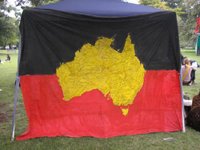A touch of the tar

‘A touch of the tar’, I’ve heard that expression several times recently. A peculiarly repugnant British expression based upon the notion of racial purity. To have ‘a touch of the tar’ was to bring into question one’s reliability, it not only implied miscegenation but also adultery or otherwise unlawful relationships. Indeed up until 1944 in W.A., it was unlawful for a person of ‘aboriginal descent’ to have sexual relations with a person who was not of ‘aboriginal descent’. In Rebe Taylor’s book, Unearthed, about Kangaroo Island, she documents how the possession of traces of ‘aboriginal blood’ marked a person out for exclusion from the other families of the island. Kangaroo Island provides a stark example of what was commonplace throughout Australia up until the 1950’s and some would argue still today - the exclusion of indigenous Australians from all economic and social intercourse on their own land.
The demand for ‘land rights’ since the 1960’s has been a recognition that not only for people who still retained occupancy of their country but also for the dispossessed of the cities, the right to even be in public spaces, like towns, cinemas, swimming pools, had been fought for and lost and won again. The right to exist without being invisible still haunts people which is why the right to stay in the Domain in Melbourne or outside the Cathedral are issues of such passion. The right to not be invisible.(see also GST - Genocide, Soveriengty & Treaty site.)
Mabo made a difference because it recognized the invisible occupiers of Australia. As a result, it has led to recognition of traditional law and traditional culture. The Courts are changing the way they deal with people, local Councils and schools are choosing to fly the Aboriginal flag alongside the Australian and State Flags and people are searching for that ‘little bit of tar’ that might make them a traditional Australian sometimes out a sense of genuine longing and compassion sometimes out of misplaced pride and venality to seek a share in their ‘riches’. Of course, most people who have been here for more than 4 or 5 generations will have some traditional Australian relations even if they don’t have any ‘Aboriginal blood’ themselves. This is as much to do with the maths of ‘six degrees of separation’ as it is to do with the illicitness or otherwise of these relationships.
Of course there is far more grief than wealth in these stories because every one of them contains a ‘stolen generation’ or two, a child taken because of the whiteness of it‘s skin, to be redefined as an Indian, Italian anything but an Australian. A lie to haunt a life and a family.
Blackness of course demanded institutionalisation, police, jails, reserves, children’s homes, and missions. It demanded invisibility. The old equation of the tar brush and racial hatred continues to hold its grip on people right through to the present day. In the 1960’s, the historian, C.D.Rowley, divided Australia into ‘colonial’ and ‘post-colonial’ halves. The south east to Brisbane, and the south west , were ‘post-colonial’ the rest retained the attitudes and beliefs of the ‘colonial period’. This divided in attitudes amongst the wadjela still persists to this day and is the chief reason that Hall’s Creek, Alice Springs and Palm Island amongst others are disaster zones of humanity.
There is change on the horizon, the mining industry in places like Kalgoorlie and the Pilbara is often the source of progressive approaches to traditional owners. Mabo has made pragmatism rather than ideology important. Nevertheless, imprisonment and football are still the major alternatives in a young boys life.
Traditional Australians take a rather different approach to family relations to their colonial masters. The idea of ‘keeping one’s blood pure’ and marrying one’s own kind are derided and warned against in many stories told by traditional people. The world is divided into two paths, that of your family and that of your in-laws, the people who you can marry. It is not just people but plants, animals and places that are your mother’s or brother’s, or your husband’s or mother-in-law’s in relation to you. Everything is related. In general, we inherit our ‘path’ or our ‘skin’ from our father’s side.
In some places, the world is divided again, by generation. You share your ‘skin’ with your grandmother(father’s mother) or grandfather(father’s father) and your spouse is distinguished from your parent’s spouse. In the Western Desert, there are eight or six subdivisions and the rules though complicated to an outsider are well understood by children and regarded as natural. In this environment, a stranger, after a while and some discussion, is allocated a ‘skin’ that defines his or her relationship to the community and individuals. That defines that persons rights and obligations, whether they carry them out or not.
In prison too, men ‘make brothers’ with each other as part of the cultural resistance to the contingent relationships of the ‘mainstream’. Brothers are not contingent but are made for life, and tie families as well as individuals together. There is a degree of hybridisation with the romance of Afro-American culture, which has played a part in popular traditional Australian culture since Bobbi Sykes and other’s introduced the politics of ‘black power’ in the 1960’s.
Nevertheless, to be related, in traditional Australian culture, is not a question of blood or blackness. It is a question of visibility and presence, and of respect and pride in one’s family, our family.

3 Comments:
A great post. thanks.
thanks for posting this.
Intersting.
Post a Comment
<< Home